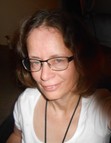The Definition of Writing Full-Time?
The above question has taken quite a bit of time for me to process. My futuristic always pictured that I would write full-time, and it got me through some very bad times. Then suddenly I discovered that my high adaptability would make that impossible. So I asked about it at a mini-coaching call. Carolyn Ivy Stein wanted me to post about it, so here it is.
The coach: So what is your definition of a full-time writer?
Me: Uh–
And I realized that I didn’t have any definition. It’s been formed by the wave of writers on the internet, all talking about writing full-time. Most of them appear to think it means quitting the day job. I’m also reasonably certain a lot of them don’t understand the implications of that. You know, like Sidney Harris’ famous New Yorker comic showing a complicated formula with a step labeled “Then a miracle occurs.”
I worked with a writer like that. He envisioned himself happily marketing the book to bestseller status (high in woo; he loved marketing). Writing the book? He kind of skipped over that part.
Erp…
Historically, writing does not pay well. For the most part, you’re never going to get rich off it. Writer Beware has an old post that brings this up in the third paragraph.
This was something I knew early on (the comment about Ernest Rydberg is mine, which is actually how I found the post). I came into the new world of publishing believing that you really had to love writing first, above everything else. Because writing has an apprenticeship that can take years.
I don’t like the word apprenticeship because it implies there’s someone guiding you like a fantasy blacksmith teaching his apprentice how to destroy magic in a cursed sword. I think of apprenticeship as the master needing cheap help, teaching them as they worked.
Writing fiction doesn’t have that. There’s nothing a “master” can off-source to cheap labor (a beginner writer) like that. So our learning often starts out as craft books, articles in writing magazines, maybe interviews with the authors. A writing conference can be a gold mine because of the access. I attended a packed room at a Washington Independent Writer’s Conference for an Agent Question and Answer. All those things that showed up on the top ten lists (i.e., Don’t use prologues, don’t use dream sequences, don’t use adverbs) were what the agents advised. We all dutifully wrote down everything they said.
And yet, all of it was extremely basic, easy to do. There’s little in writing that easy to do,. You might find one skill easy, and another really challenging.
Still, writers look for the mentors to help them. And those tend to write about things that are easy to learn (the internet is not friendly for in-depth learning). Then the writers receive a form rejection from an agent or don’t have sales, so they become frustrated because no one will tell them what they are getting wrong.
Guess what else is easy to learn/teach? Productivity. You can easily tell someone to set goals (except me, anyway, being a goalless person), plug in the writing time on a calendar, and somehow saying that you will write 1,000 words in that time will happen. There are books on how to get even more words with tools and pockets of time.
So this is what the writing industry has evolved into. Writers talk about marketing, sales, productivity, word count, and process. They don’t talk about creativity.
With such intense focus on productivity and marketing, it’s hard to take part in the writing world. I’ve been lectured on not following the proper writing process rules, even though it does not matter. The only thing that counts is writing a good story and fi. But the rules are easy for writers to rely on, and they seek them out.
The creativity is why I got into writing in the first place. I love learning cool things about writing, making the words dance, and just enjoying the process. My characters have cool adventures, and I occasionally blow up a monster or have a dog or cat be a character. And I love breaking outside the boundaries.
But I don’t know what to make of my original envisioning of writing full time. The coach defined it more along the way Victoria Strauss described it in the post I linked to above. His was that you have a day job, you write 10 hours a week, and finish books.
What do you think writing full-time means?



